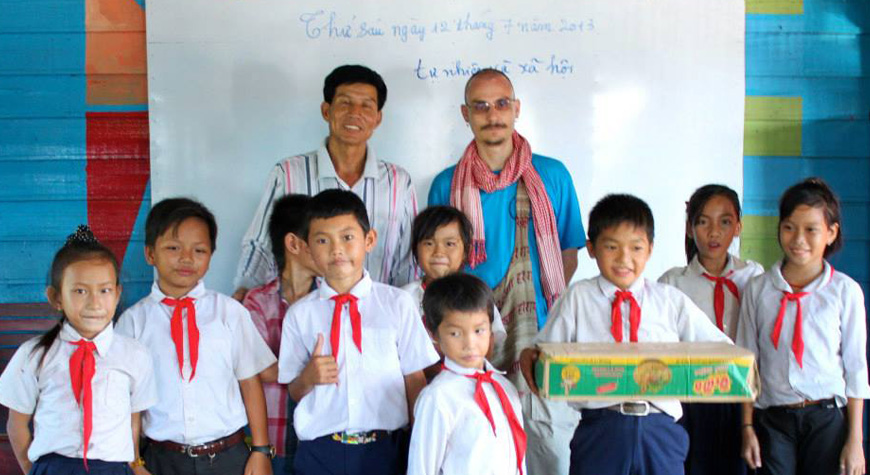Tonle Sap Lake was not really part of our plans when my wife and I decided to spend 10 days in Cambodia for a much-needed holiday. But she had a small accident and was unable to walk properly for few days, so we decided on a short trip to the floating village of Tonle Sap.
About a one-hour drive from the town of Siem Reap, Tonle Sap is the largest fresh water lake in Southeast Asia. We arrived at a tourist packed marina, and were told that a shared boat cost the same as a private boat (US$20/person), which did not make sense and sounded rather fishy. But I pushed aside any suspicion, and opted for the private tour
We had an English speaking guide, who explained to us about the lives of the villagers, who are mostly Vietnamese and Cham ethnics. Lacking electricity and running water, the locals use the lake to bathe, wash their clothes, cook, and, of course, relieve themselves. Those with more money can afford to buy drinking water at some floating deposit.
On our boat ride, we passed a floating basketball court, a floating Vietnamese Catholic school, and houses with a Buddhist shrine at their entrance. In the water, kids were playing, fishing or bathing. We stopped at a panoramic terrace café, and as I was chatting with our guide, a boy about 3 or 4 years old with a snake around his neck approached us.
I took his picture and immediately after his mom shouted, "One dollar pleeaaaseee!"
As I had expected this, I gave him a dollar bill and he ran away happily. My guide, however, told me it was wrong to support this kind of “slavery”. Those kids are exploited by their parents, who never send them to school, he said. If foreign tourists wish to help, we can do so by buying some goods for the villagers instead, he suggested.
I had a strange feeling again, the second time after the boat offers at the marina, but I wanted to see where the trip was going to lead me, so I agreed to buy something for the villagers.
On the way back, the guide took me to a local convenient shop. The shop owner looked as though he was waiting for me. Enthusiastically, he offered a 10 kilogram sack of rice for $100, more than 10 times the price in Jakarta, Indonesia, where I live.
OK, I wanted to help, but that was way out of my budget. We were not luxury tourists. We stayed at a cheap backpacker hostel, ate local street food and tried to save as much money as possible. Sorry, kids, it looks like these tourists won’t be coming bearing gifts of rice today.
But then I remembered an article I read on a local magazine the day before about scams on tourists involving charitable activities in Cambodia. The scam usually begins with a friendly person approaching an unsuspecting tourist, asking simple questions and being nice to win his or her trust. After a while, the local may ask whether the tourist wishes to help a local school, orphanage or whatever charity organization by buying some rice.
Now how can you say no to this, when every day you see people still suffering from the Khmer Rouge atrocities or losing their limbs from the land mines that are still scattered around Cambodia’s countryside long after the war was over?
If all goes as planned, the tourist then goes to a local shop, buys a $100 bag of rice, takes it to a charity organization, and gets a nice picture taken to show the good deed to his or her friends back home. Once the tourist leaves the premise, however, the charity middleman will take back the sack of rice from the school or organization, return it to the same shop and share the profit with the shop owner. And, voilà! Drinks for the scammers, courtesy of another gullible tourist.
I knew I was falling into their trap, and as I was on a private trip instead of a shared tour (now I understood the illogical rates—so people will choose private boats), it was harder to escape. I could have, of course, refused to buy anything, but I didn’t really want to look like a cheap, insensitive western bastard. And, anyway, the little voice inside my head said, what if I was not being scammed? What if I could make a difference to some poor kids’ lives today?
I decided to look for something cheaper than the $100 rice, and found it in a carton containing 50 packs of instant noodles. The price was, again, a crime against humanity: $50 a carton. That’s $1 per package of noodle, also ten times the price I would have paid in Jakarta. But I had a plan in mind, so I paid the carton of noodles.
We went to the Vietnamese Catholic School at the center of the lake. In the classroom, 23 kids looked happy to see me arriving like Santa. I played my part and allowed the guide to take my picture with the kids and the teacher.
"Ok, let's go now,” my guide said after we were done with the perfunctory photo-op.
“Nope,” I said to his surprise, “Now we share the noodles!"
He looked visibly shocked as I tore open the carton of noodles and began to distribute the packages to the happy kids—two packs for each student and four for the teacher.
You see, by breaking open the carton, and distributing the noodles to the kids and teacher, I made it harder to take the noodles back to the shop to be resold. It was the least I could do to ensure the kids would at least go home with something. I do hope they got to keep the noodles, but if the scammer eventually had their way and collected back the noodles from the kids, I always believe that in a theft, the one who ends up suffering the most is the thieves.
Scammers aside, I still strongly recommend a visit to Cambodia. Meet the locals, talk to them and you will come home so much enriched. Despite their haunting dark past, Cambodians may be some of the sweetest, most peaceful and serene people in Asia.
In fact, I miss the place already.
About Stefano Notarbartolo:
Italian by birth and by chance—NOT by choice—Stefano is a spiritual seeker who has been in self-exile in Asia since the tender age of 24. A self-professed free thinker, he teaches asanas to pays the bills, while still aspiring to propagate 'real Yoga' (whatever that is) messages to the masses. He gets annoyed when people who are not smart enough try to fool him, and he also hates anything that comes out of the mouth of a conservative.








Comments